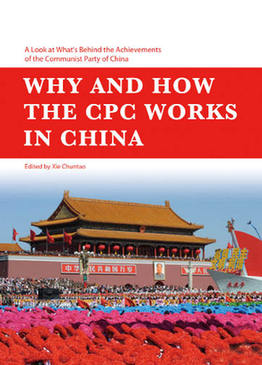Why and How the CPC Works in China
Why and How the CPC Works in China
By ZHAO QIZHENG
 |
Why and How the CPC Works in China Edited by Xie Chuntao RMB 56 Published in Beijing by New World Press |
Why and How the CPC Works in China, edited by Xie Chuntao, a professor with the Party School of the Central Committee of the CPC, records how the Communist Party of China established the People's Republic and began the construction of a modern socialist country. This time span is a period I not only lived through but I also took part in this entire process. The history and anecdotes recorded in this book are part of my own experience, but my memories were a little bit jumbled. Reading the book put everything in place for me and helped me reflect further on this historic process.
Georg Hegel divided our portrayal of history into three categories.First is the original history, written by contemporaries about the history they were involved in, and includes oral history and memoirs. This is usually the most valuable of historical records. The second is reflective history, written by later generations who view an historical period from the perspective of their own with additional evidence. History textbooks belong in this category. The third is philosophic history which analyzes the reasons why history happened the way it did. Hegel's The Philosophy of History is the best example of this category, and I think Why and How the CPC Works in China in essence belongs in the first category.
This is a book written by contemporaries, people who are part of the history they delve into. It deals with the philosophic dimensions readers are bound to consider. In modern times, it is not uncommon for people to assert that the CPC can no longer work, and some even prophesized that it will fail. This book looks beneath the facts at the course of history and asks the readers to come to their own conclusions. The authors make a strong case for why the CPC can overcome all future obstacles and continue on the path of success.
Since carrying out the policy of reform and opening-up, China has developed socialism with Chinese characteristics, striking out on an independent course and striding to the center of the world arena from the periphery of it (as at the Yalta Conference). However, negative speculations about China's future never die down, as we see in works warning of the "China threat" and the "coming collapse of China." In last two to three decades, conversations in Western countries continue to build scenarios and assess the possibilities for a "China at the crossroads." Their conclusions are largely the fruits of their own imagination, and the hypotheses vary wildly from China bearing down with "a strong hegemony" to being "a country in disorder" or a nation "due to collapse." But reality does not bear these predictions out, the authors argue. China is a country making progress and achieving prosperity and has been doing so all along.
Accurate observation of China is scarce, compromised by lack of information and existing prejudice. Besides the stereotypes fostered by the Cold War mentality, an important reason for the groundlessness of negative Western speculation is its dependence on its own media, which means it's hard for a true picture of China to emerge. There is a definite need for books written in China telling the facts about the nation. But to convey their message to Western readers, such publications have to pin down the topics on which foreign readers have questions to be answered. Writers would go a long way to bridging the cultural divide if they made their coverage and topics comprehensible to another culture.
Why and How the CPC Works in China pores over the history that not only caters to the curiosity of Chinese readers, but also to the interest that foreigners have in our nation, and sets out more than just the bare facts on the background to the country's development. I look forward to the success of this concise and vivid English translation and expect it will appeal to many foreign readers.
---------------------------
Zhao Qizheng is a member of the Standing Committee and chairman of the Foreign Affairs Committee of the Chinese People's Political Consultative Conference. He served as deputy mayor of Shanghai and minister of the State Council Information Office.
Brief Introduction to Why and How the CPC Works in China
The editorial team for this book was headed by Professor Xie Chuntao, deputy director of the Party History Teaching and Research Department, Party School of the Central Committee of the CPC. He and several experts and scholars of the Party school spent two years completing the work, which consolidates their research conducted during the last several decades. The book is structured around 13 questions most frequently asked by domestic and foreign China-watchers about the evolution of the CPC over the past 90 years, digging into its past and presenting a clear picture of its future.
Reflections on the CPC made by distinguished persons and respected media personalities from all over the world are included. Zhao Qizheng expressed his goal for the undertaking, "It explains the development road China took in a lively, vivid and accessible narration, and refrains from covering up the zigzags in that road and the failures experienced during the CPC's leadership. Finally, it answers your questions about China."
Since the Chinese version was published last March, about 200,000 copies have been sold. At the 41st London Book Fair in 2011, British-based New Classic Press negotiated for the rights to the English version and German, Russian, Spanish, Hungarian, Danish and South Korean publishers also anticipate the release of the English edition.
Services
Economy
- Eco-agriculture and Eco-tourism Power Nanchang’s Green Development
- Balance Environmental Protection and Economic Prosperity – Nanchang Looks to European Technology for Green Development
- Sustainable Growth Requires Wiser Energy Use
- Chinese Economy: On the Path of Scientific Development
- China's Economy over the Last Ten Years

